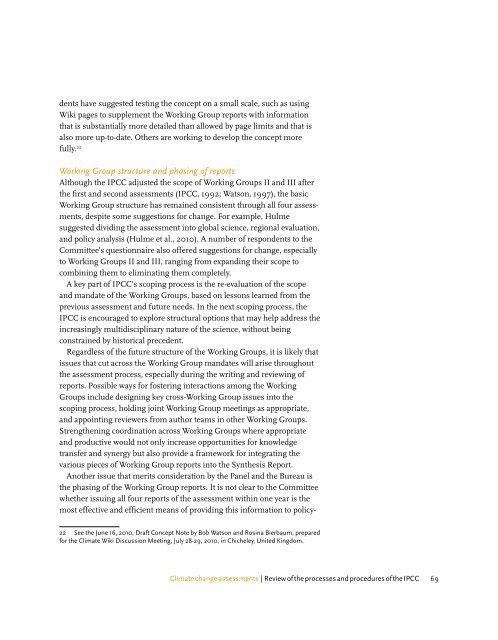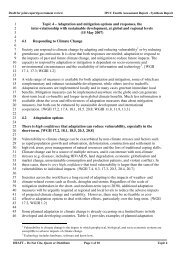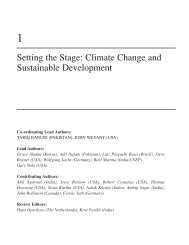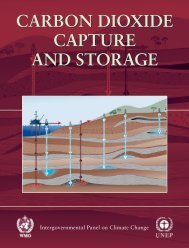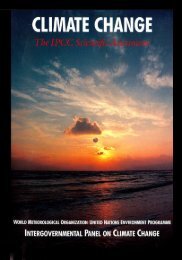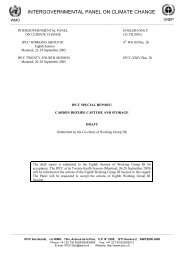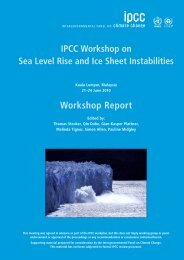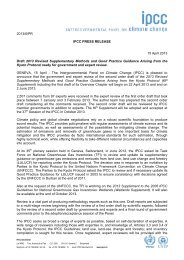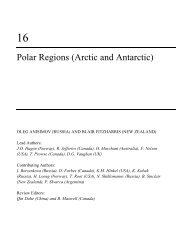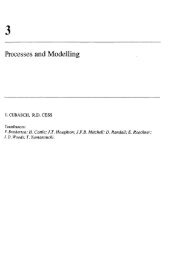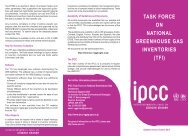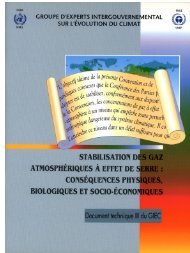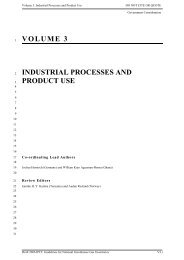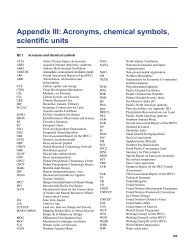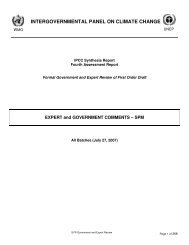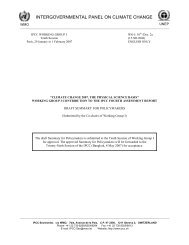Climate change assessments Review of the processes and ...
Climate change assessments Review of the processes and ...
Climate change assessments Review of the processes and ...
You also want an ePaper? Increase the reach of your titles
YUMPU automatically turns print PDFs into web optimized ePapers that Google loves.
dents have suggested testing <strong>the</strong> concept on a small scale, such as using<br />
Wiki pages to supplement <strong>the</strong> Working Group reports with information<br />
that is substantially more detailed than allowed by page limits <strong>and</strong> that is<br />
also more up-to-date. O<strong>the</strong>rs are working to develop <strong>the</strong> concept more<br />
fully. 22<br />
Working Group structure <strong>and</strong> phasing <strong>of</strong> reports<br />
Although <strong>the</strong> IPCC adjusted <strong>the</strong> scope <strong>of</strong> Working Groups II <strong>and</strong> III after<br />
<strong>the</strong> first <strong>and</strong> second <strong>assessments</strong> (IPCC, 1992; Watson, 1997), <strong>the</strong> basic<br />
Working Group structure has remained consistent through all four <strong>assessments</strong>,<br />
despite some suggestions for <strong>change</strong>. For example, Hulme<br />
suggested dividing <strong>the</strong> assessment into global science, regional evaluation,<br />
<strong>and</strong> policy analysis (Hulme et al., 2010). A number <strong>of</strong> respondents to <strong>the</strong><br />
Committee’s questionnaire also <strong>of</strong>fered suggestions for <strong>change</strong>, especially<br />
to Working Groups II <strong>and</strong> III, ranging from exp<strong>and</strong>ing <strong>the</strong>ir scope to<br />
combining <strong>the</strong>m to eliminating <strong>the</strong>m completely.<br />
A key part <strong>of</strong> IPCC’s scoping process is <strong>the</strong> re-evaluation <strong>of</strong> <strong>the</strong> scope<br />
<strong>and</strong> m<strong>and</strong>ate <strong>of</strong> <strong>the</strong> Working Groups, based on lessons learned from <strong>the</strong><br />
previous assessment <strong>and</strong> future needs. In <strong>the</strong> next scoping process, <strong>the</strong><br />
IPCC is encouraged to explore structural options that may help address <strong>the</strong><br />
increasingly multidisciplinary nature <strong>of</strong> <strong>the</strong> science, without being<br />
constrained by historical precedent.<br />
Regardless <strong>of</strong> <strong>the</strong> future structure <strong>of</strong> <strong>the</strong> Working Groups, it is likely that<br />
issues that cut across <strong>the</strong> Working Group m<strong>and</strong>ates will arise throughout<br />
<strong>the</strong> assessment process, especially during <strong>the</strong> writing <strong>and</strong> reviewing <strong>of</strong><br />
reports. Possible ways for fostering interactions among <strong>the</strong> Working<br />
Groups include designing key cross-Working Group issues into <strong>the</strong><br />
scoping process, holding joint Working Group meetings as appropriate,<br />
<strong>and</strong> appointing reviewers from author teams in o<strong>the</strong>r Working Groups.<br />
Streng<strong>the</strong>ning coordination across Working Groups where appropriate<br />
<strong>and</strong> productive would not only increase opportunities for knowledge<br />
transfer <strong>and</strong> synergy but also provide a framework for integrating <strong>the</strong><br />
various pieces <strong>of</strong> Working Group reports into <strong>the</strong> Syn<strong>the</strong>sis Report.<br />
Ano<strong>the</strong>r issue that merits consideration by <strong>the</strong> Panel <strong>and</strong> <strong>the</strong> Bureau is<br />
<strong>the</strong> phasing <strong>of</strong> <strong>the</strong> Working Group reports. It is not clear to <strong>the</strong> Committee<br />
whe<strong>the</strong>r issuing all four reports <strong>of</strong> <strong>the</strong> assessment within one year is <strong>the</strong><br />
most effective <strong>and</strong> efficient means <strong>of</strong> providing this information to policy-<br />
22 See <strong>the</strong> June 16, 2010, Draft Concept Note by Bob Watson <strong>and</strong> Rosina Bierbaum, prepared<br />
for <strong>the</strong> <strong>Climate</strong> Wiki Discussion Meeting, July 28-29, 2010, in Chicheley, United Kingdom.<br />
<strong>Climate</strong> <strong>change</strong> <strong>assessments</strong> | <strong>Review</strong> <strong>of</strong> <strong>the</strong> <strong>processes</strong> <strong>and</strong> procedures <strong>of</strong> <strong>the</strong> IPCC 69


